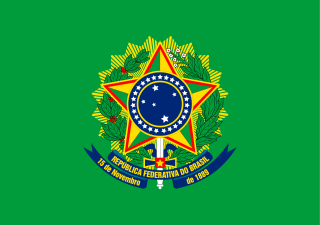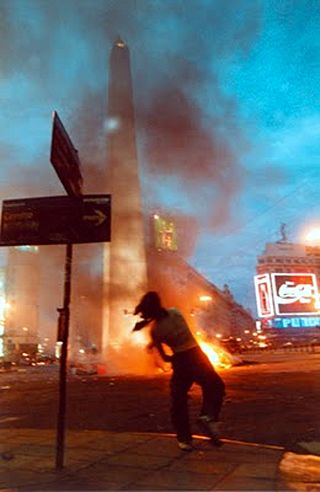The government of Argentina, within the framework of a federal system, is a presidential representative democratic republic. The President of Argentina is both head of state and head of government. Executive power is exercised by the President. Legislative power is vested in the National Congress. The Judiciary is independent from the Executive and from the Legislature, and is vested in the Supreme Court and the lower national tribunals.

The Dominican Republic is a representative democracy, where the President of the Dominican Republic functions as both the head of the government and head of the multi-party system. Executive power is exercised by the government. Legislative power is vested in the bicameral National Congress. The Judiciary is independent of the executive and the legislature.
A presidency is an administration or the executive, the collective administrative and governmental entity that exists around an office of president of a state or nation. Although often the executive branch of government, and often personified by a single elected person who holds the office of "president", in practice, the presidency includes a much larger collective of people, such as chiefs of staff, advisers and other bureaucrats. Although often led by a single person, presidencies can also be of a collective nature, such as the presidency of the European Union is held on a rotating basis by the various national governments of the member states. Alternatively, the term presidency can also be applied to the governing authority of some churches, and may even refer to the holder of a non-governmental office of president in a corporation, business, charity, university, etc. or the institutional arrangement around them. For example, "the presidency of the Red Cross refused to support his idea." Rules and support to discourage vicarious liability leading to unnecessary pressure and the early termination of term have not been clarified. These may not be as yet supported by state let initiatives. Contributory liability and fraud may be the two most common ways to become removed from term of office and/or to prevent re-election.
The United States order of precedence is an advisory document maintained by the Ceremonials Division of the Office of the Chief of Protocol of the United States which lists the ceremonial order, or relative preeminence, for domestic and foreign government officials at diplomatic, ceremonial, and social events within the United States and abroad. The list is used to mitigate miscommunication and embarrassment in diplomacy, and offer a distinct and concrete spectrum of preeminence for ceremonies. Often the document is used to advise diplomatic and ceremonial event planners on seating charts and order of introduction. Former presidents, vice presidents, first ladies, second ladies, and secretaries of state and retired Supreme Court justices are also included in the list.

The president of Argentina is both head of state and head of government of Argentina. Under the national constitution, the president is also the chief executive of the federal government and commander-in-chief of the armed forces.

The president of Brazil, officially the president of the Federative Republic of Brazil or simply the President of the Republic, is the head of state and head of government of Brazil. The president leads the executive branch of the federal government and is the commander-in-chief of the Brazilian Armed Forces.

The December 2001 crisis, sometimes known as the Argentinazo, was a period of civil unrest and rioting in Argentina, which took place during December 2001, with the most violent incidents taking place on 19 and 20 December in the capital, Buenos Aires, Rosario and other large cities around the country. It was preceded by a popular revolt against the Argentine government, rallying behind the motto "All of them must go!", which caused the resignation of then-president Fernando de la Rúa, giving way to a period of political instability during which five government officials performed the duties of the Argentine presidency. This period of instability occurred during the larger period of crisis known as the Argentine great depression, an economic, political, and social crisis that lasted from 1998 until 2002.
The Jamaican order of precedence is as follows:
- Charles III, King of Jamaica
- Governor-General of Jamaica
- Prime Minister of Jamaica
- Deputy Prime Minister of Jamaica
- Leader of the Opposition

The presidential line of succession defines who may become or act as President of the Federative Republic of Brazil upon the death, resignation, incapacity or removal from office of the elected president, and also when the president is out of the country or is suspended due to impeachment proceedings.
The Spanish order of precedence is currently prescribed by Royal Decree 2099/1983. The decree establishes the order of precedence of national official activities as well as common regulations to activities organised by municipalities, autonomous communities and other public institutions. The general order established by the decree is modified if the event takes place in the capital, Madrid, instead of elsewhere in Spain.
The order of precedence in Brazil is a symbolic hierarchy of officials used to direct protocol. It is regulated by Presidential Decree number 70.274 of March 9, 1972, signed by former President Emilio Medici. The following order applies to ceremonies hosted by the federal government.
The Order of Precedence in Sri Lanka the protocol list at which Sri Lankan government officials are seated according to their rank. This is not the list of succession.

Juan Carlos Maqueda is an Argentine lawyer, politician, and a member of the Supreme Court of Justice of Argentina since 2002. As Provisional President of the Argentine Senate in 2001 and 2002, he chaired two legislative assemblies to elect a new President of Argentina during the 1998–2002 Argentine great depression and was acting President in the absence of the President.

Horacio Massaccesi is an Argentine politician and former Governor of Río Negro Province.

Ricardo Gil Lavedra is an Argentine lawyer, magistrate, and politician. A member of the Radical Civic Union, Gil Lavedra served as Minister of Justice during the early presidency of Fernando de la Rúa, from 1999 to 2000. From 2009 to 2013, he was a member of the Argentine Chamber of Deputies elected in Buenos Aires.
The order of precedence in the Philippines is the protocol used in ranking government officials and other personages in the Philippines. Purely ceremonial in nature, it has no legal standing, and does not reflect the presidential line of succession nor the equal status of the three branches of government established in the 1987 Constitution.
The Honourable or The Honorable is an honorific style that is used as a prefix before the names or titles of certain people, usually with official governmental or diplomatic positions.
The Chilean order of precedence is currently prescribed by the Public Ceremonial and Protocol Regulation. This regulation establishes the order of precedence of national official activities as well as common regulations to activities organized by provinces and regions. The general order established by the decree is modified if the event takes place elsewhere in Chile instead of in Santiago Metropolitan Region.
The presidental line of succession de Argentina the order in which officials can assume the office of the President of Argentina in case of vacancy due to illness, death, resignation or removal.







